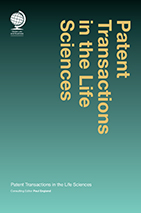Safeguarding secrets when employees leave
January 2014
Life sciences companies innovate rapidly and many of their employees, who drive the research and development on which these businesses are built, are necessarily party to commercially sensitive technical and commercial information. Employees are now also very mobile. Hence, disputes often arise when former employees use information for their new employer that they have learnt at their previous company. The situation is exacerbated when the business operates across national boundaries, because although the European Commission has recently proposed a Directive for the harmonisation of trade secrets law across the Member States, no such consistency of approach currentlyexists. Businesses therefore have little certainty when sharing information under terms of confidence. In this article our lawyers from Austria, Germany and the UK explain their respective national approaches to the issue of ex-employees in possession of trade secrets.

This article contains extracts from the forthcoming book Patent Transactions in the Life Sciences (Globe Law and Business Publishing, August 2014).
Austria
What is a trade secret?
Under Austrian law there is no specific definition of a trade secret, even though the term “trade secret” (Geschäftsgeheimnis) appears in several laws. According to the majority opinion among Austrian scholars, a trade secret is defined as a fact and/or knowledge of an economic and commercial nature which is: s
- important with regard to the business of the company;
- relevant for its competitive position in a specific market;
- known only by individuals familiar from the inside with what concerns the business of the company; and,
- intended to be kept confidential and with respect to which there is a legitimate economic interest in its confidentiality (e.g., customer lists, customer contracts, strategic questions, conditions of purchase, distribution channels, turnover on customer accounts, origin of raw materials, price calculation, sample collection, tenders, recipes, information on the production and storage of goods, methods of production, design or engineering drawings, patented systems and the like).
 On the other hand, Austrian case law and literature have excluded, inter alia, the following elements from the protection granted to a trade secret: obvious facts, literary knowledge accessible to everyone, and general economic data.
On the other hand, Austrian case law and literature have excluded, inter alia, the following elements from the protection granted to a trade secret: obvious facts, literary knowledge accessible to everyone, and general economic data.
The general notion of a trade secret is shared by both civil and criminal law. The relevant information must relate to the damaged company and be of relevance to its ability to compete in a certain market. Furthermore, for a trade secret to be recognised as such by an Austrian Court, the company has to prove its legitimate interest (berechtigtes Interesse) in the non-disclosure of the trade secret.
General protective provisions
The main civil provisions in Austria with respect to the protection of trade secrets are included in the Federal Act against Unfair Competition of 1984 - Bundesgesetz gegen den unlauteren Wettbewerb (“UWG”). The provisions of Sections 11, 12 and 13 of the UWG are the most relevant ones and are criminal provisions. Nonetheless, they form the basis for civil law cease-and-desist orders and damage claims. UWG protects against violations of employees and violations of third parties, among whom are included former employees and anybody who receives information on trade secrets. The relevant penalties are identical in either case, independent of whether the employee is still working for the company or has already terminated his employment relationship with the company of which he infringes the trade secret.
§ 11. (1) UWG provides that an employee of a company who, during the employment relationship, discloses without authorisation any trade secret, which due to his employment has been entrusted or has been made accessible to him, to another party for competitive purposes, shall be sentenced by the Court to a term of imprisonment of up to three months or to a fine of up to 180 per diem rates.
In addition, § 12. (1) UWG states that anyone who, without authorisation and for competitive purposes, uses or discloses to another party any technical documents or requirements entrusted to him in the course of business, shall be sentenced by the Court to a term of imprisonment of up to three months or a fine of up to 180 per diem rates.
Additional provisions on the protection of trade secrets with regard to employees are to a certain extent also included in other Austrian laws:
- the Data Protection Act - Datenschutzgesetz, which relates to data of legal persons and provides a more general requirement of data secrecy regarding all data made available to the employee during his activity for the employing company, notwithstanding any further obligations of secrecy. Under this law, trade secrets are generally considered as “information” (Angaben) in Section 4(1);
- the Patent Act – Patentgesetz, which provides that the employee must keep his employee’s invention secret prior to the acceptance of the invention by his employer (in order not to obstruct patentability).
Demonstrating infringement
 Infringement of a trade secret can be prosecuted only upon the request of the injured party. In order to initiate legal proceedings against a former employee for a trade secret’s infringement based on the UWG, all of the following elements have to be proven by the company:
Infringement of a trade secret can be prosecuted only upon the request of the injured party. In order to initiate legal proceedings against a former employee for a trade secret’s infringement based on the UWG, all of the following elements have to be proven by the company:
- the existence of a trade secret;
- the fact that the trade secret has been entrusted or made accessible to the former employee during the course of his employment relationship;
- the infringer’s imminent intent to use the trade secret in an unauthorised way or disclose it for competitive purposes;
- the trade secret owner’s legitimate economic interest in the confidentiality of the information included in such trade secret.
Civil remedies
The following cumulative civil remedies are available under the UWG for a trade secret’s infringement:
- cease-and-desist orders;
- removal of the infringement;
- damages.
Although Austrian law does not provide for the rendering of profits, such a remedy has been granted, in certain cases, by the Austrian Supreme Court.
Concerning damages, the following non-cumulative options are at the disposal of the company that is the legitimate right holder of a trade secret infringed by its former employee: (a) compensation of actual economic loss, including loss of profits (the damage is calculated on the damage caused by the infringement of the trade secret); (b) recovery of the infringer’s profit (the damage is based on profits the infringer has obtained from his wrongdoing); (c) adequate licence (the damage is based on the appropriate monetary amount that a licensee would be required to pay for the legitimate use of such trade secret – analogous to a licence).
Punitive damages cannot be recovered within the Austrian judicial system.
Criminal measures
A violation of a trade secret may also trigger a criminal liability, as provided under Sections 122, 123 and 124 of the Austrian Criminal Code (Strafgesetzbuch); additionally, as mentioned above, the UWG establishes criminal provisions to protect trade secrets. The provisions contained in the Criminal Code require the offender to possess the following categories of intent:
- conditional intent (bedingter Vorsatz) for use or exploitation of a trade secret (Section 122(1) of the Criminal Code);
- conditional intent for exploiting or making available to somebody else for exploitation or publication trade confidential information (Section 123 of the Criminal Code);
- conditional intent for exploitation, use or use abroad (Section 124 of the Criminal Code);
- intent to obtain a pecuniary advantage for himself or somebody else or to cause a detriment to somebody else (Section 122(2) of the Criminal Code).
 The more specific provisions on the infringement of professional confidentiality (Section 121 of the Criminal Code) and the infringement of official secrecy (Section 310 of the Criminal Code) are designed to protect the legitimate interest in the confidentiality of a trade secret. The conduct that is considered as criminal by these Sections is the disclosure or exploitation of trade secrets that have been entrusted to the offender during a professional relationship (or which have been obtained by espionage).
The more specific provisions on the infringement of professional confidentiality (Section 121 of the Criminal Code) and the infringement of official secrecy (Section 310 of the Criminal Code) are designed to protect the legitimate interest in the confidentiality of a trade secret. The conduct that is considered as criminal by these Sections is the disclosure or exploitation of trade secrets that have been entrusted to the offender during a professional relationship (or which have been obtained by espionage).
The provisions included in the UWG require conditional intent by the offender to disclose a trade secret for competitive purposes and such mental condition requires the awareness that the information at stake constitutes a trade secret. A conviction in criminal proceedings may represent the basis for a damage claim in civil proceedings. This can be initiated independently of the criminal proceedings.
The mere attempt to commit any of the offences mentioned above may cause, depending on various circumstances, a criminal liability as well because, according to Section 15(2) of the Criminal Code, an attempt occurs when the decision to carry out an offence has been actuated by an act that directly precedes the performance of the offence).
On the other hand, there are circumstances when an employee leaves a company in which the company is not protected for trade secret violations:
- according to Section 122(4) of the Criminal Code, the offender shall not be prosecuted in cases where his violation is justified by a compelling public or private interest. Such exculpatory condition requires a balance between the different interests involved;
- Section 19(3) of the UWG provides that no penalty applies to an employee who committed the conduct upon instruction of his employer, provided that he could not reasonably be expected to refuse performing such an action due to his economic dependence on the employer.
Finally, it should be noted that preparatory acts are not culpable and that only the risk of a trade secret disclosure would not, as a general rule, cause any criminal liability.
Practical steps
In business practice, Austrian companies are used to protecting their trade secrets towards employees by means of:
- non-disclosure agreements signed with their employees;
- confidentiality policies;
- non-disclosure or confidentiality clauses included in employment agreements.
All these solutions are enforceable under Austrian contract law. After the termination of the employment relationship with its employee, the company can file an injunction action and may enforce contractual damages or file damage claims.
The UK
Introduction
This update reviews some of the issues concerning the law of confidentiality in the UK and the impact of recent case law in this area. Of particular concern to those employing and working with "knowledge workers" is how to ensure any confidentiality obligations are preserved, even after the contract with that knowledge worker has ended, and we provide some practical advice on how this might be achieved.
Confidential information and trade secrets
 The legal test in the UK for what amounts to confidential information is well established and is set out in Coco v Clark. Confidential information is information that (i) has the "necessary quality of confidence" and (ii) was imparted in a "situation imposing an obligation of confidence". Examples of confidential information include customer lists, pricing details, profit margins, creative processes and recipes. A party receiving confidential information may be limited in what they can do with that information, for example they may be prevented from disclosing it to third parties or using it for their own benefit. This "duty of confidence" is intended to prevent misuse of confidential information.
The legal test in the UK for what amounts to confidential information is well established and is set out in Coco v Clark. Confidential information is information that (i) has the "necessary quality of confidence" and (ii) was imparted in a "situation imposing an obligation of confidence". Examples of confidential information include customer lists, pricing details, profit margins, creative processes and recipes. A party receiving confidential information may be limited in what they can do with that information, for example they may be prevented from disclosing it to third parties or using it for their own benefit. This "duty of confidence" is intended to prevent misuse of confidential information.
In the UK, a duty of confidence is automatically implied as between an employer and their employees, even if the contract of employment is silent on this point. The legal framework after employment has ended is also clear – in the absence of any contractual obligations, the ex-employees' duty of confidence is limited to the subset of confidential information that can be classified as "trade secrets". In Faccenda Chicken v Fowler, the term "trade secrets" was held to mean information that if disclosed to a competitor would harm the owner.
Whilst the legal frame work is clear, how it is applied in practice by the Court is unpredictable but in the past, aerodynamic designs relating to Formula 1 cars (Force India v Aerolab), technical information relating to mobile phone technology (HTC Corp v Gemalto) and company databases listing client information (Churchill Retirement Living v Luard) have all been held to be trade secrets.
Vestergaard
In the Vestergaard v Bestnet case, the issue of whether "intention" (or "frame of mind") of the defendant is relevant when assessing an alleged breach of confidence was explored. In the 1967 case of Seager v Copydex, the defendants (who had received information from the inventor and then proceeded to use that information) were held liable for breach of confidence even though they were not "conscious" of the fact that what they were doing amounted to a misuse of confidential information – the Court held that "their state of mind when using the information was irrelevant to the question of whether they had abused the confidence".
In Vestergaard, the Supreme Court distinguished Seager on its facts and clarified that unless special circumstances applied, an ex-employee's lack of knowledge that trade secrets are being misused could constitute a defence and preclude liability. Following Vestergaard, it would seem that an ex-employer will now find it more difficult to succeed on a breach of confidentiality claim in so far as a defendant can now raise the defence of unknowing use of confidential information.
Confidentiality – an appropriate form of IP?
Compared to other forms of intellectual property rights, confidentiality has a number of advantages, including:
- No formal registration procedure
- No/minimal cost
- Applicable to all subject matter
- No time limit as to the protection it offers
- Can be used in conjunction with other forms of intellectual property
 These benefits are also mentioned in a proposed directive for harmonising trade secret law in the EU and in which this area of law is inconsistency applied between Member States. For example, whilst most (if not all) jurisdictions recognise confidentiality obligations as between an employer and employee during the term of employment, the approach differs in respect to what happens after that employment has ended. Furthermore, what amounts to confidential information and/or a trade secret also differs between Member States.
These benefits are also mentioned in a proposed directive for harmonising trade secret law in the EU and in which this area of law is inconsistency applied between Member States. For example, whilst most (if not all) jurisdictions recognise confidentiality obligations as between an employer and employee during the term of employment, the approach differs in respect to what happens after that employment has ended. Furthermore, what amounts to confidential information and/or a trade secret also differs between Member States.
One recent UK example highlights the uncertainty in this area. In Force India v Aerolab, there was a dispute as to whether information used was in fact confidential and/or a trade secret. The defendant argued that the information in question was so memorable that it could be regarded as forming part of the employees' skill, knowledge and experience. The Court of Appeal confirmed the decision of the High Court and held that information does not cease to be confidential simply because it is memorable.
Practical steps to protect trade secrets
As explained above, a particular problem faced by employers is demonstrating whether a particular piece of information has the necessary qualities to amount to being confidential and/or a trade secret.
Recent case law does not change the established position so the advice remains to clearly (i) label sensitive information as being confidential, (ii) limit its dissemination as far as possible and (iii) restrict access to such information, such as by using password protection.
Another layer of protection can also be achieved by incorporating express confidentiality terms in any contracts of employment. Not only does this add a contractual element, but may also help in demonstrating to the Court knowing misuse of confidential information by the employee.
Conclusions
The law of confidentiality and trade secrets is a powerful tool that employers can use to protect information that either cannot or is inadequately protected by other forms of intellectual property. However, the law of confidentiality will only apply if it can be shown that the information in question is in fact confidential and coupled with recent case law in the UK which appears to retreat from a "strict liability" analysis, employers are advised to take proactive steps to maximise the prospects that such protection can be deployed if and when needed.
Germany
 Know-how can be protected by German Unfair Competition Law from unlawful dissemination only while it is secret. It can be difficult to practically manage the public dissemination of secret know-how by employees and consultants. This may in particular apply, if an employee (for instance from the research and development department) does not leave the company on good terms.
Know-how can be protected by German Unfair Competition Law from unlawful dissemination only while it is secret. It can be difficult to practically manage the public dissemination of secret know-how by employees and consultants. This may in particular apply, if an employee (for instance from the research and development department) does not leave the company on good terms.
Mitigating the risk of dissemination to the public requires non-disclosure agreements (respectively clauses in employment contracts) with employees or consultants working for a company. Of course, if an employee or consultant disseminates secret know-how to the public, this will be a breach of a non-disclosure agreement – nevertheless, it will destroy know-how protection for the information now having become public knowledge. Accordingly, it is a challenge to maintain know-how protection.
It is difficult to maintain a full non-disclosure obligation with employees once they have left the company. Under German Law this may, depending on the exact circumstances, be considered anti-competitive for the former employee, giving rise to a claim for compensation for maintaining secrecy after having left employment.
If you have any questions on this article or would like to propose a subject to be addressed by Synapse please contact us.


Bernhard is an associate in the Trade Marks & Designs group based in our Vienna office.

Rainer
Schultes

Dr Manja
Epping
Manja is a partner and Head of Life Sciences for Germany based in our Munich office.
"In the UK, a duty of confidence is automatically implied as between an employer and their employees, even if the contract of employment is silent on this point."


